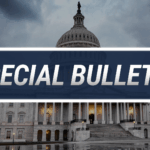UHC ordered to refund payment within 60 days.
On Aug. 13, the U.S. Court of Appeals for the District of Columbia ruled in UnitedHealthcare Insurance Company, et al. v. Becerra that the Medicare statute’s “actuarial equivalence” and “same methodology” requirements do not apply to the Overpayment Rule, requiring Medicare Advantage (MA) plans to return overpayments to the Centers for Medicare & Medicaid Services (CMS) that were made based on unsupported diagnosis codes.
The Overpayment Rule requires that if an insurer learns a diagnosis it submitted to CMS for payment lacks support in the beneficiary’s record, the insurer must refund that payment within 60 days.
The ruling reverses an earlier victory for the insurers, wherein a lower court held that the Overpayment Rule violated the Medicare statute’s requirement of “actuarial equivalence” and “same methodology requirements” by devaluing previously determined payments to MA plans through a retroactive review of beneficiary medical records. The recent ruling has wide-ranging implications for MA plans and providers.
The principle of “actuarial equivalence” originates in how CMS is required to calculate payments to MA plans. Unlike traditional Medicare or fee-for-service payment models, MA plans are paid a monthly capitated per-beneficiary fee by CMS to cover the cost of services that CMS calculates may be needed by each beneficiary. In the simplest of terms, the Medicare statute requires CMS to annually adjust those monthly per-capita payments to reflect what traditional, fee-for-service Medicare paid in a base year for a beneficiary population modeled to be “actuarially equivalent” to the MA plan’s beneficiary population, utilizing “risk scores” and “risk factors” to determine risk-adjusted payments to the MA plans.
In order for this model to function, CMS relies on MA plans to report accurate diagnosis codes. CMS regulations require MA plans to certify the accuracy of the information they report to CMS, including diagnosis codes. The Overpayment Rule comes into play in situations when the diagnosis codes reported by MA plans are not supported by documentation in the beneficiary’s medical record.
The Overpayment Rule in this instance is an obligation on MA plans that Congress imposed in the Patient Protection and Affordable Care Act of 2010. The Act mandates that MA plans report and return any overpayment that they receive from CMS within 60 days of identifying it. The Act defines “overpayment” as “any funds that a person receives or retains under (the Medicare or Medicaid programs) to which the person, after applicable reconciliation, is not entitled.” CMS later promulgated regulations to implement this rule. In the preamble to these regulations, CMS indicated that, among other things, diagnosis codes submitted by MA plans that are not supported by documentation in the medical record will result in an overpayment under the rule.
Importantly, failure to report and return overpayments in accordance with the Overpayment Rule may give rise to liability under the False Claims Act (FCA). In general, the FCA imposes civil liability for knowingly submitting false claims to the government. The FCA carries severe consequences, including treble damages and a per-claim penalty that increases each year with inflation ($11,803 per claim for 2021). The FCA also allows individuals, referred to as relators, to initiate the prosecution under a qui tam action, in which the government may decide to intervene, and wherein the relator is entitled to a share of the government’s recovery.
In the instant case, UnitedHealthcare argued that the Overpayment Rule violated the “actuarial equivalence” requirement in the Medicare statute because CMS was not able to demonstrate that the rate of payment errors to healthcare providers in traditional, fee-for-service Medicare is lower than the rate of payment errors to the MA plan.
The Circuit Court disagreed, holding that the Overpayment Rule and the “actuarial equivalence” requirement are not to be read together, because the statutes do not cross-reference each other and serve different purposes. Specifically, the Court found that the purpose of the “actuarial equivalence” provision is to require CMS to model a demographically and medically analogous beneficiary population in traditional Medicare to determine the prospective lump-sum payments to MA plans – while the Overpayment Rule, in contrast, applies after the fact, to require MA plans to refund any payment they obtained based on a diagnosis they know lacks support in their beneficiary’s medical records. UnitedHealthcare’s argument and the lower court’s finding that the Overpayment Rule violated the “same methodology” requirements in the Medicare statute was overruled on similar grounds.
UnitedHealthcare’s final claim to be considered by the Court was that the Overpayment Rule is arbitrary and capricious, in violation of the Administrative Procedure Act (APA), comparing it to Risk Adjustment Data Validation (RADV) audits, another error-correction mechanism to which MA plans are subject. While CMS proposed systemic adjustment for RADV audits, the Court found the two overpayment methodologies distinguishable. The Court also found the application of risk adjustment in one context and not the other to be reasonable, while also reiterating that the actuarial equivalence requirement does not pertain to the statutory overpayment refund obligation.
Finally, the regulations promulgated by CMS to implement the Overpayment Rule included an element that is not in the statute: providers and plans are required to return overpayments that they either know about or “should have determined through the exercise of reasonable diligence.” However, the lower court in the instant case struck down this portion of the regulation. CMS did not challenge this finding on appeal, and the Circuit Court did not disturb it. Instead, the Circuit Court noted that “nothing in the Overpayment Rule obligates insurers to audit their reported data … the Rule only requires insurers to refund amounts they know were overpayments, i.e., payments they are aware lack support in a beneficiary’s medical records.” Therefore, this decision may limit the general applicability of the Overpayment Rule, and mandatory repayment, in cases where the provider or plan “knowingly” received an overpayment.
As noted, the implications of the decision on MA plans and providers are expected to be wide-reaching. MA plans will certainly have to be more proactive in substantiating the diagnosis codes reported by providers that they rely on, in turn, to report to CMS.
The impact on providers will largely depend on the nature of their provider agreements with MA plans, as well as the plans’ manuals and policies. Where accurate diagnosis codes or updates to diagnosis codes are conditions of payment to the provider, providers are likely to see more audits, enforcement actions, and clawbacks from MA plans.
Other providers can expect to see MA plans strengthen their provider agreements, making providers more responsible for reporting accurate diagnoses, returning payments under the Overpayment Rule, or shifting liability under the FCA.






















